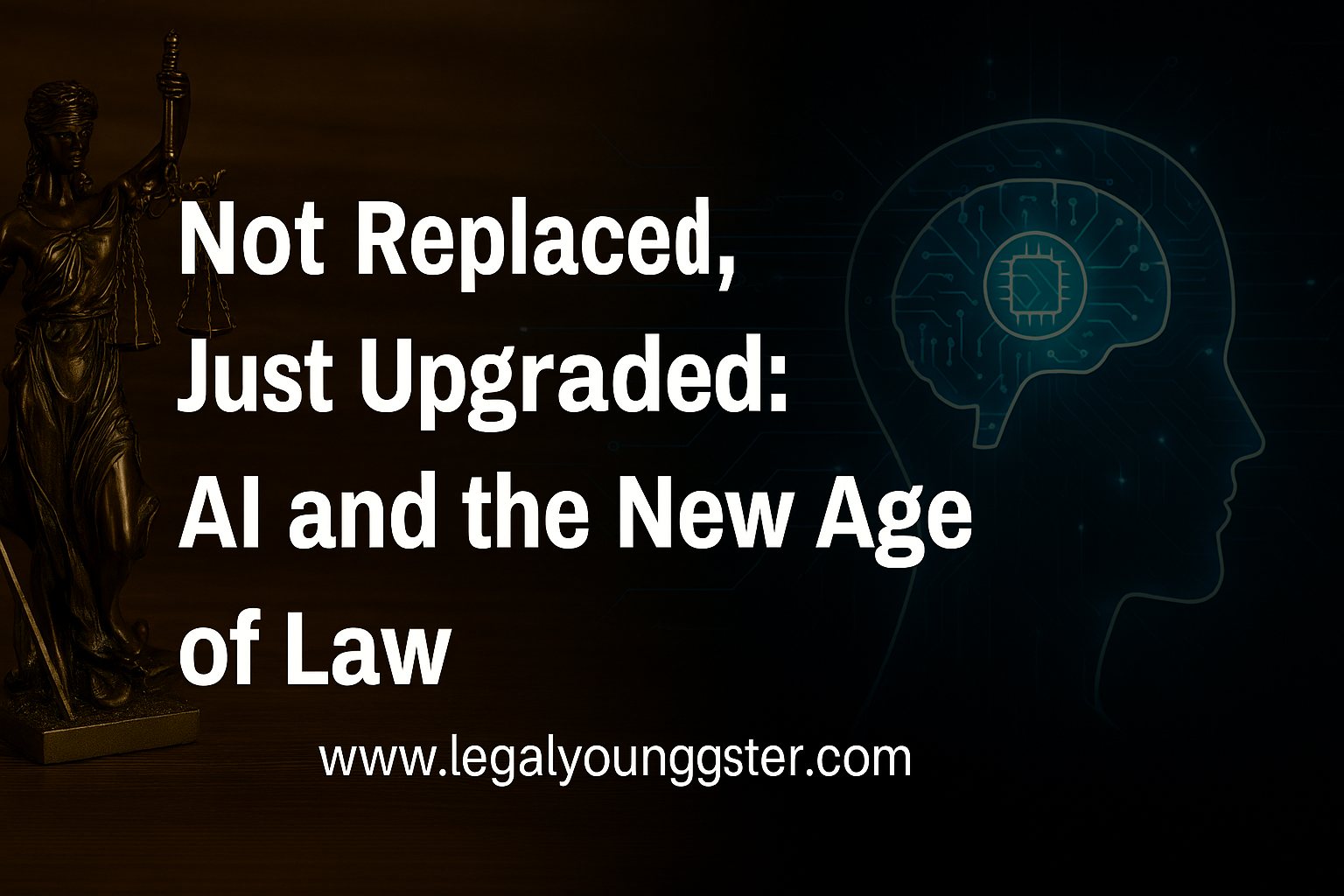



Author-Divya Madrecha
Balasaheb Apte College of Law
Introduction
Teaching robots to think, or at least to sufficiently imitate human intelligence to carry out tasks that previously required a human mind, is the fundamental goal of artificial intelligence (AI). AI may now be found in everything from managing money to detecting illnesses to making music, operating drones, and even assisting you in selecting your next binge-watch. It is currently rapping on the doors of legal offices and courtrooms.
The legal industry, which is sometimes viewed as conservative and sluggish to adapt, is currently being examined digitally. “Why pay a lawyer when software is cheaper?” is one example. or “Are lines of code replacing armies of costly lawyers?” have generated both laughter and concern. The fact that lawyers, who make their income by debating, suddenly have to defend their relevance is almost poetic.
Let’s correct the record, though. Although there are legitimate concerns, the story of lawyers being replaced by machines is exaggerated. AI is here to change the way legal services are provided, making them quicker, more intelligent, and easier to access. It is not to take your robe and gavel. Instead of man against machine, the future of law will be man with machine, cooperating to improve justice and client results.
What is Artificial Intelligence in Law?
Who doesn’t want to remain on top of trends and expand their business? Adopting AI in the legal industry is about embracing innovation to provide services that are more client-focused, quicker, and smarter—it’s not just about following a trend.
AI tools present a significant opportunity for law companies to improve decision-making, automate tedious operations, simplify legal research, and streamline procedures. AI can greatly speed up workflows and facilitate sophisticated analysis, but it cannot replace the ethical, empathetic, and nuanced reasoning that lawyers bring to the table. In the end, this allows lawyers to concentrate on what really matters: strategy, advocacy, and client care.
Legal practitioners can improve the caliber and effectiveness of their work, fortify client relationships, and create new business opportunities by incorporating AI.
These systems rely on technologies like natural language processing (NLP), machine learning (ML), and predictive analytics to perform tasks that once required hours of manual legal work.
AI tools can scan and interpret large volumes of case law, statutes, and legal documents in seconds, making them invaluable for legal research and document review. They can also provide drafting assistance, conduct contract analysis by spotting risky clauses, and even predict case outcomes based on patterns in past judgments.
Popular legal AI platforms include CaseMine, which provides case mapping and analysis; ROSS Intelligence, known for AI-driven legal research; Lexis+ AI, which integrates generative AI for smart legal queries; and Casetext CoCounsel, which assists lawyers in drafting, reviewing, and summarizing legal documents.
While these tools don’t replace legal judgment, they enhance efficiency and precision, allowing lawyers to focus more on strategy, advocacy, and client relations.
Applications of AI in the Legal Field
This section dives deeper into real-world uses of AI in the legal profession, showing how specific tools and technologies are being applied in day-to-day legal tasks—not just in theory, but in actual practice across firms, courts, and legal aid platforms.
Legal Research
One of the most time-consuming responsibilities in the legal profession has always been conducting legal research. In the past, it was necessary for attorneys to manually go through countless amounts of statutes, case law, and legal commentary—a fundamental and time-consuming procedure. For years, it seemed impossible to simplify this procedure without compromising accuracy. However, AI has altered that. AI can extract pertinent information in a matter of minutes due to its rapid scanning, sorting, and interpretation capabilities of large volumes of legal material. In addition to expediting the process, it improves the thoroughness and accuracy of research, freeing up attorneys to concentrate more on strategy and analysis rather than spending hours going through papers.
Contract Drafting and Review
The foundation of legal practice has always been the drafting of contracts and agreements, however it is also one of the most time-consuming and prone to mistakes. Errors are possible because of the extreme attention to detail it requires, particularly when deadlines are short. By creating automated drafting tools that use pre-made, legally compliant templates to produce papers fast and precisely, artificial intelligence has greatly simplified this procedure. Contracts can be examined by sophisticated AI-powered software for irregularities, omitted terms, and dangerous provisions, identifying any problems before they materialize. Additionally, it gains insight from a company’s historical drafting trends, providing customized recommendations and enhancements over time. In addition to lowering human error, this frees up attorneys to concentrate on more strategic, higher-level tasks like client advice and negotiations.
Due Diligence
AI is essential to the due diligence process because it can quickly scan and analyze vast amounts of documents to find possible hazards while maintaining accuracy and consistency. Lawyers may handle more clients and transactions without sacrificing the caliber or thoroughness of their work thanks to this automation, which drastically cuts down on the time needed for manual review.
Predictive Analysis
In order to forecast the possible results of ongoing litigation, artificial intelligence also helps with the analysis of past case data. Artificial intelligence (AI) helps attorneys to more accurately predict the chances of winning by looking at trends in previous rulings, judge conduct, and comparable fact situations. With this knowledge, legal teams may better customize their tactics, decide whether to go to trial or settle, and reduce risks early on.
Challenges and Ethical Considerations
Despite its many benefits, artificial intelligence has drawbacks in the legal industry. Data security and ethics are two of the most urgent issues. Sensitive client data is frequently involved in legal work; putting this data to AI systems exposes it to possible breaches, unauthorized access, or misuse, posing significant cybersecurity and confidentiality concerns.
Furthermore, lawyers’ own analytical and critical thinking skills may gradually deteriorate as a result of an excessive reliance on AI tools. After all, legal reasoning is largely dependent on interpretation, discretion, and subtlety—skills that are impossible for robots to imitate. Lawyers run a far higher risk of missing contextual nuances or incorrectly interpreting precedents if they start depending only on algorithm-generated recommendations.
The potential for bias in AI results is yet another significant drawback. These algorithms use historical data, which may be biased or faulty in and of itself. Because of this, AI’s judgments could unintentionally confirm preexisting biases or yield false and deceptive information. “Excess of anything is dangerous,” as the saying goes, and technology is no exception. AI has the potential to improve legal work, but it must be utilized as a tool rather than a substitute, with ongoing human supervision, moral principles, and legal accountability in place.
Regulation and Role of Legal Education
Existing laws are finding it difficult to keep up with the ethical, security, and accountability issues that artificial intelligence (AI) raises as it continues to be incorporated into the legal system. Problems like algorithmic prejudice, data privacy violations, and a lack of transparency must be addressed right away. To solve these issues and guarantee the proper application of AI in the legal sphere, legislators, the Supreme Court, and Bar Councils must work together to develop a strong legislative framework.
However, today’s law students hold the key to the future of the legal profession. Law schools must update their curricula to include courses on legal technology, data privacy, algorithmic accountability, and the foundations of artificial intelligence in order to prepare their students for this changing environment. In addition to technical expertise, students should be educated on the constraints and moral conundrums surrounding the application of AI in the legal field. By doing this, we can raise a generation of lawyers who are aware of the dangers and obligations associated with digital transformation in addition to being tech-savvy.
Tweet, Post, Jail: How Free is Your Speech in Digital India?
The Future of Legal Practice with AI
When AI and human intelligence work together, the legal system will function more efficiently, much like a car does when all of its pieces work together harmoniously. When technology and legal professionals work together rather than compete, justice is best served. A new era of hybrid lawyer-technologists—professionals that blend legal knowledge with technical know-how to produce quicker, more intelligent, and more equitable results—is anticipated.
AI has the potential to significantly increase access to justice for those who cannot afford traditional legal services. AI can help provide legal aid to underprivileged groups and expedite court procedures by automating repetitive work and streamlining legal procedures.
But striking the correct balance is where this transformation’s true power resides. AI provides speed, efficiency, and scalability, but no machine can replace the empathy, moral discernment, and contextual awareness that human lawyers bring to the table. Instead of replacing attorneys, the future of legal practice will focus on enhancing their skills and developing a more inclusive, considerate, and compassionate legal system.
Conclusion
To all the lawyers who are concerned about the future of their practice, know that you are safe. Even though AI isn’t a far-off idea anymore, it won’t take your place. Rather, its incorporation into the legal profession presents a chance to improve the long-standing legal profession, guaranteeing quicker, more effective justice delivery without sacrificing quality.
However, enormous potential also entails enormous responsibility. As we adopt AI, we also need to consider the hazards to data security, ethical dilemmas, and the peril of being overly dependent on technology. These issues highlight how crucial it is to have precise rules and regular human oversight.
It all comes down to striking the correct balance in the end. As in life, the legal profession will grow most easily when technical innovation and human wisdom complement one another and support one another in the fight for justice.